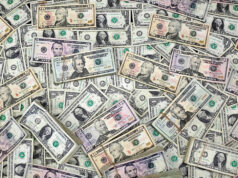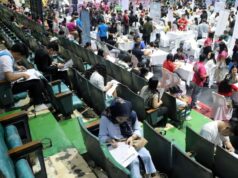Gov’t makes partial award of Treasury bills
By Melissa Luz T. Lopez, Senior Reporter
THE GOVERNMENT made a partial award of the P15 billion worth of Treasury bills (T-bills) it offered yesterday, as market players largely preferred shorter-termed papers and demanded higher rates for the one-year tenor.
Bids received during Tuesday’s auction reached P28.724 billion, nearly double the amount the Bureau of the Treasury wanted to raise. However, the bureau only awarded P11.236 billion worth of papers, as bulk of the demand went to the three-month and six-month instruments.
Rates saw mixed movements during the offering.
The Treasury raised P5 billion by offering 91-day papers as bids reached triple the auction size at P15.086 billion. Rates moved slightly higher to average 3.451% coming from the 3.439% fetched the previous week.
Demand for the 182-day tenor also remained strong as the offer was oversubscribed, attracting P10.492 billion and allowing the Treasury to fully award the P4 billion it eyed to raise. The average rate even slipped to 3.934% from the 3.958% recorded during last week’s offering.
In contrast, demand for the 364-day notes remained sluggish as investors only put forward P3.146 billion in bids versus the P6 billion the government was programmed to raise. The Treasury even rejected some bids and awarded only P2.236 billion, as it capped bids at 4.35% even as offers went as high as 4.9%.
This brought the average yield to 4.226%, higher than the 3.986% seen a week ago which were rejected by the Treasury.
At the secondary market yesterday before the auction, the 91-, 182- and 364-day papers were quoted at 3.4965%, 3.8272% and 4.0853%, respectively.
After the auction, yields on the three-month, six-month and one-year papers closed at 3.4413%, 3.8306% and 3.9187%.
National Treasurer Rosalia V. De Leon said market preference towards the shorter T-bills is due to the decision of the Bangko Sentral ng Pilipinas (BSP) to raise benchmark rates by 25 basis points last Thursday.
“Still, rates continue to trend upwards given expectations from some that there will still be additional rate hikes coming from the BSP,” Ms. De Leon told reporters following the auction.
The Monetary Board tightened policy settings last week as inflation continues to trend higher. It now expects prices to maintain its ascent until the end of the year.
Sought for comment, a trader said yesterday’s auction results were expected.
“Most investors are still asking for higher premiums on the longer tenors like the one-year… Concerns regarding domestic inflation and domestic budget deficits lead to supply risks,” the trader said via phone.
Inflation has averaged 4.1% as of end-April, already beyond the 2-4% target set by the central bank for the full year.
Work is also underway for additional bond offerings for investors, the National Treasurer said, in anticipation of the government’s increased funding requirements.
Ms. De Leon said plans to offer dollar-denominated notes before the year’s end will be for pre-funding as well as for debt management.
“[W]e are more proactive given that we already expect what would be the emerging developments in the market next year, so we are just seeing if we can have more lead time in terms of preparation for our funding for 2019,” she told reporters.
Finance Secretary Carlos G. Dominguez III has said the dollar bond sale will be timed ahead of future tightening moves by the United States Federal Reserve, which are expected to push global yields higher.
Meanwhile, the government has also engaged five banks for its planned issuance of yen-denominated debt papers.
Ms. De Leon said they have already mandated the following lenders for the maiden issuance of samurai bonds: Mizuho Bank, Ltd., The Daiwa Bank, Ltd., Nomura, Sumitomo Mitsui Banking Corp., and the Mitsubishi UFJ Group.
Plans for a fresh offering of retail Treasury bonds are likewise on the table, she added.
The government plans to borrow a total of P888.23 billion this year to plug its budget deficit that is capped at 3% of the country’s gross domestic product, or P523.7 billion.
The Development Budget Coordination Committee raised the share of foreign borrowings to 35% this year in a bid to diversify its financing base, from 26% previously expected for 2018 and 20% in 2017. The government will then maintain the borrowing mix at 75-35% for 2019 to 2022, still in favor of domestic sources.



